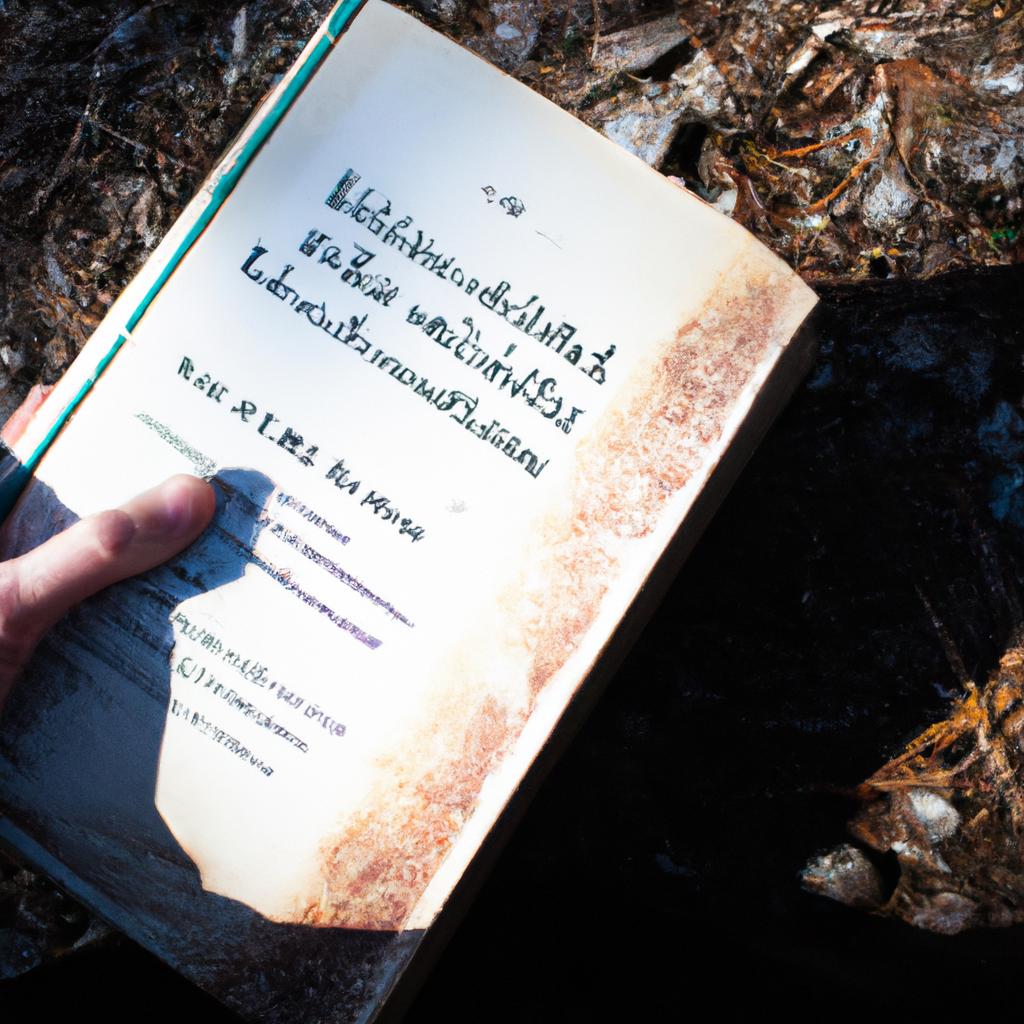Epistemology: The Foundations of Knowledge

In the pursuit of knowledge, individuals often rely on various sources to acquire information and form beliefs about the world. However, it is essential to critically examine the foundations upon which our knowledge is built in order to ascertain its validity and reliability. This examination falls within the domain of epistemology, a branch of philosophy that seeks to understand how we come to know what we claim to know. Epistemology explores questions such as: What constitutes knowledge? How can we differentiate between justified belief and mere opinion? By delving into these fundamental inquiries, epistemology provides us with valuable tools for assessing the basis of our understanding.
To illustrate the significance of this field, consider a hypothetical scenario where two people hold opposing views on climate change. Person A asserts that human activity significantly contributes to global warming, while person B contends that natural factors are primarily responsible for changes in Earth’s climate. Both individuals have formed their beliefs based on different sets of evidence and reasoning processes. In this context, epistemology enables us to evaluate not only the credibility of each person’s claims but also the methods they employed to arrive at their respective conclusions. Through an exploration of epistemic justifications and standards of evidence, we can better comprehend how individuals arrive at differing positions even when even when they have access to similar information. Epistemology helps us examine the reliability and validity of the evidence used by each person, the logical reasoning employed, and any biases or assumptions that may influence their perspectives.
By critically evaluating the foundations of knowledge in this scenario, we can discern which claims are better supported by evidence and reasoning. This process allows us to make more informed judgments about complex issues like climate change and recognize the limitations of our own understanding.
Furthermore, epistemology also aids in distinguishing between justified beliefs and mere opinions. It encourages us to question whether our convictions are based on solid evidence and rational analysis or if they are merely subjective preferences or unfounded assertions.
In summary, epistemology is a crucial field for examining how we acquire knowledge and form beliefs. By engaging with its principles, we can better evaluate the credibility of different viewpoints, understand the basis of our own convictions, and navigate the complexities of acquiring knowledge in an increasingly information-rich world.
Justifying Our Beliefs
Justifying Our Beliefs
Imagine a woman named Sarah who has been experiencing intense back pain for several months. She visits multiple doctors, seeking an explanation and a solution to her discomfort. Each physician provides a different diagnosis and proposes various treatments. Sarah is left feeling confused and uncertain about which course of action to pursue. This scenario illustrates the fundamental challenge we face in justifying our beliefs – how do we determine what information to trust and accept as true?
In order to navigate this complex task of justification, it is essential to understand the methods by which we evaluate our beliefs. One approach involves relying on empirical evidence, such as scientific experiments or observations. By subjecting claims to rigorous testing, we can increase our confidence in their accuracy. However, even within the realm of empirical evidence, conflicting results may arise due to differing methodologies or biases.
Another method for justifying beliefs lies in appealing to authority or expertise. We often rely on individuals who possess specialized knowledge or experience in a particular field when forming our own opinions. While this can be an effective strategy for navigating unfamiliar topics, it also carries risks. Authorities can make mistakes or hold biased perspectives themselves, leading us astray if we blindly follow their guidance.
To further complicate matters, emotions play a significant role in shaping our beliefs. Emotionally charged events or personal experiences have the potential to influence our judgment and override rational analysis. Consider the following emotional responses that might impact belief formation:
- Fear: A fear-driven response may lead individuals to adopt certain beliefs as a means of self-preservation.
- Hope: The anticipation of positive outcomes can foster unwarranted optimism and bias towards specific viewpoints.
- Anger: Strong feelings of anger may cloud judgment and result in irrational acceptance or rejection of ideas.
- Trust: Placing excessive trust in authorities without critically evaluating their arguments can hinder intellectual growth.
Additionally, let us examine the following table illustrating different ways emotions affect belief formation:
| Emotion | Impact on Belief Formation |
|---|---|
| Fear | Can lead to irrational decisions based on self-preservation. |
| Hope | May foster unwarranted optimism and bias towards specific viewpoints. |
| Anger | Strong feelings of anger can cloud judgment, resulting in irrational acceptance or rejection of ideas. |
| Trust | Over-reliance on authorities without critical evaluation hinders intellectual growth. |
As we delve into the intricate realm of epistemology, it becomes clear that navigating the justification of beliefs is a multifaceted endeavor. In the subsequent section, we will explore another crucial aspect: the role of reason in knowledge acquisition.
[Transition]: With an understanding of the complexities involved in justifying our beliefs, let us now turn our attention to examining how reason contributes to the acquisition of knowledge in Epistemology.
The Role of Reason in Knowledge
Section H2: The Role of Reason in Knowledge
Imagine a scenario where a person is presented with conflicting information about climate change. On one hand, they encounter scientific studies and expert opinions that support the existence and severity of global warming caused by human activities. On the other hand, they come across individuals who deny these claims, citing alternative theories or asserting conspiracy theories. In such a situation, it becomes crucial to evaluate the available evidence and employ reason in order to discern the truth.
Reason plays an instrumental role in acquiring knowledge as it enables us to critically analyze information and draw logical conclusions. By applying rational thinking, we can assess the validity of arguments and differentiate between sound reasoning and fallacies. Moreover, reason allows us to identify inconsistencies or contradictions within our existing beliefs, prompting us to reassess them and potentially revise our understanding of the world.
To highlight the significance of reason in knowledge acquisition, consider the following points:
- Reason helps prevent cognitive biases: Emotions, personal experiences, and societal influences often shape our beliefs. However, relying solely on subjective factors can lead to cognitive biases that hinder objective understanding. Engaging in reasoned analysis assists in mitigating these biases by encouraging impartial evaluation.
- Reason promotes intellectual growth: Through critical thinking and logical deduction, reason pushes us beyond surface-level acceptance of ideas. It challenges assumptions and encourages exploration into deeper layers of thought, fostering intellectual growth.
- Reason facilitates problem-solving: When faced with complex problems or dilemmas, employing reason allows for systematic examination of different perspectives and potential solutions. This methodical approach enhances decision-making processes informed by evidence rather than mere intuition.
- Reason supports effective communication: Clear articulation of thoughts backed by sound reasoning aids effective communication among individuals engaged in intellectual discourse or collaborative endeavors.
| Strengths | Limitations |
|---|---|
| Encourages objectivity | Can be influenced by personal bias |
| Enhances analytical skills | May not account for intuitive insights |
| Facilitates logical reasoning | Requires time and effort |
| Enables critical evaluation | Can be limited by the availability of information |
In light of the role that reason plays in knowledge acquisition, it becomes evident that relying solely on emotions or personal beliefs is insufficient. By employing rational thinking, we can critically evaluate arguments, identify inconsistencies, overcome biases, and engage in objective analysis. In doing so, reason acts as a guiding force in our pursuit of truth and understanding.
Understanding the importance of reason in acquiring knowledge lays the foundation for exploring another vital aspect – the significance of experience.
The Importance of Experience in Knowledge
Epistemology: The Foundations of Knowledge
In this section, we will explore another crucial aspect of knowledge formation – the Importance of Experience. To illustrate this point, let us consider an example:.
Imagine a young student who has been studying physics diligently for years. They have acquired extensive theoretical knowledge through textbooks and lectures but have never conducted any experiments or observed physical phenomena firsthand. Despite their vast understanding of the subject on a conceptual level, it is arguable that their knowledge lacks depth and practicality without direct experiential engagement.
Experience plays a vital role in broadening our understanding and shaping our knowledge base. It allows us to interact with the world around us, providing valuable insights that go beyond abstract theories. Consider the following points:
- Contextualization: Experiences offer a context-specific perspective that enables us to grasp nuances that may not be apparent from mere reasoning alone.
- Emotional Connection: Engaging with experiences can evoke emotions that enhance our comprehension and retention of information.
- Empirical Validation: Through experience, we can test hypotheses and validate claims by observing real-world outcomes.
- Application Potential: Practical experience equips individuals with skills necessary for effectively applying theoretical knowledge to solve complex problems.
To further emphasize the importance of experience, let us examine a table comparing two scenarios involving different levels of experiential involvement:
| Scenario | Knowledge Acquisition |
|---|---|
| Scenario A | Primarily based on reason |
| Limited personal connection | |
| Minimal empirical validation | |
| Restricted application potential | |
| Scenario B | Balanced blend of reason and experience |
| Enhanced emotional connection | |
| Greater scope for empirical validation | |
| Expanded applicability |
From this comparison, it becomes evident that experience enriches the process of knowledge acquisition and strengthens its practical application.
In light of these insights, it is crucial to recognize that a comprehensive understanding of any subject necessitates an integration of reason and experience. By acknowledging the importance of both factors, we can forge a more holistic approach to knowledge formation. In the subsequent section, “Questioning Our Assumptions,” we will delve into how critical thinking allows us to challenge our preconceived notions and further refine our understanding.
Questioning Our Assumptions
Transitioning from the previous section on the importance of experience in knowledge, we now turn our attention to questioning our assumptions. In order to truly understand and expand our knowledge, it is essential that we critically examine the underlying assumptions upon which our beliefs are built. By doing so, we can uncover potential biases or limitations that may hinder our pursuit of truth.
To illustrate this point, let us consider a hypothetical scenario: Sarah, a passionate environmentalist, firmly believes that human activity is solely responsible for climate change. She has based her belief on extensive research studies and expert opinions supporting this view. However, by questioning her assumption and engaging with alternative perspectives, such as natural climatic cycles or external factors beyond human control, Sarah opens herself up to a broader understanding of the complex dynamics at play.
Questioning assumptions allows us to challenge preconceived notions and broaden our intellectual horizons. It encourages critical thinking and fosters an environment where diverse viewpoints are valued. To effectively question our assumptions, here are some strategies individuals can employ:
- Engage in active listening: Truly listen to others’ viewpoints without immediately dismissing them.
- Seek out opposing arguments: Deliberately expose oneself to differing opinions and engage in respectful dialogue.
- Embrace uncertainty: Recognize that absolute certainty is often elusive and be open to revisiting previously held beliefs.
- Cultivate empathy: Develop an empathetic mindset towards those who hold different views, seeking to understand their perspective rather than simply dismissing it.
By employing these strategies, we create opportunities for personal growth and intellectual development. We begin to see the world through multiple lenses rather than relying solely on our own limited vantage point.
| Strategies for Questioning Assumptions |
|---|
| 1. Engage in active listening |
| 2. Seek out opposing arguments |
| 3. Embrace uncertainty |
| 4. Cultivate empathy |
In conclusion, questioning our assumptions is a crucial step towards expanding our knowledge. By examining the foundations upon which our beliefs are built, we can foster intellectual growth and challenge biases that may hinder our pursuit of truth. In the subsequent section on “The Reliability of Beliefs,” we will explore how this process opens up avenues for evaluating the reliability and validity of our own convictions.
The Reliability of Beliefs
Section H2: The Reliability of Beliefs
Building upon our previous exploration of questioning assumptions, it is essential to delve into the Reliability of beliefs in order to understand the foundations of knowledge. To illustrate this concept, consider a hypothetical scenario where a renowned scientist publishes groundbreaking research claiming that eating chocolate can extend human lifespan by ten years. This finding immediately captures public attention and prompts individuals to alter their dietary habits accordingly. However, as time progresses, conflicting studies emerge challenging the initial claim, ultimately leading to confusion and skepticism among the general population.
Examining the reliability of beliefs requires us to recognize certain factors that influence our acceptance or rejection of information. These factors include:
- Confirmation bias: Our tendency to seek out information that confirms our existing beliefs rather than critically evaluating alternative perspectives.
- Authority figures: The inclination to trust experts or influential individuals without independently scrutinizing their claims.
- Emotional attachment: How emotions can cloud judgment and impact our willingness to question or modify deeply held beliefs.
- Cultural influences: Society’s customs, values, and traditions shape what we deem credible or trustworthy.
To further explore these factors and examine their implications on Belief Reliability, let us present them in a table format:
| Factors Influencing Belief Reliability | Impact |
|---|---|
| Confirmation Bias | Can hinder impartial evaluation of evidence |
| Authority Figures | May result in unquestioning acceptance |
| Emotional Attachment | Can impede objective analysis |
| Cultural Influences | Shape perception of credibility |
Understanding these factors helps shed light on why some beliefs are more reliable than others. By recognizing confirmation bias and actively seeking diverse viewpoints, we foster an environment conducive to critical thinking. Additionally, acknowledging how authority figures may inadvertently influence our judgments encourages independent verification before accepting any given proposition blindly.
In conclusion, assessing the reliability of beliefs is crucial when examining the foundations of knowledge. Understanding the presence and effects of confirmation bias, the influence of authority figures, emotional attachment, and cultural influences allows us to approach information with a discerning mindset. By doing so, we can navigate through the complexities of knowledge acquisition more effectively.
Transitioning into the subsequent section examining the coherence of knowledge, it becomes evident that analyzing belief reliability is only one facet in our quest for understanding. Moving forward, we must explore how different pieces of knowledge fit together harmoniously to form a coherent and robust framework of understanding reality.
Examining the Coherence of Knowledge
Section H2: Examining the Coherence of Knowledge
Transitioning smoothly from our previous exploration on the reliability of beliefs, we now turn our attention to examining the coherence of knowledge. To illustrate this concept, let us consider a hypothetical scenario where an individual believes in both determinism and free will simultaneously. This apparent contradiction sparks an inquiry into how such conflicting beliefs can coexist within their understanding of reality.
Examining the Coherence of Knowledge involves evaluating the logical consistency and compatibility between different beliefs or pieces of information. It requires careful analysis to ensure that these components fit together harmoniously, devoid of any internal contradictions or inconsistencies. When assessing coherence, several key factors come into play:
- Internal Consistency: The degree to which one’s beliefs align with each other and do not contradict themselves.
- External Compatibility: The extent to which one’s beliefs are consistent with established facts about the world or commonly accepted principles.
- Logical Deductibility: The ability to infer new propositions from existing ones through valid reasoning without introducing contradictions.
- Epistemic Justification: The presence of sufficient evidence or justification for holding particular beliefs.
Considered collectively, these criteria form a framework for evaluating whether a body of knowledge is coherent or not. Adhering to them helps maintain intellectual integrity and enhances confidence in the validity and reliability of our conceptual frameworks.
| Factors | Description |
|---|---|
| Consistency | Ensuring that there are no contradictions or conflicts among various elements within one’s belief system. |
| Compatibility | Assessing if one’s beliefs align with empirical evidence and widely accepted theories or principles. |
| Deductibility | Evaluating whether new propositions can be logically derived from existing ones without generating contradictions. |
| Justification | Verifying if there is adequate evidence or rational grounds supporting the adoption of specific beliefs. |
In light of these considerations, it becomes evident that maintaining coherence within our knowledge systems is vital for intellectual robustness and reliability. It allows us to navigate the complexities of reality with greater clarity and confidence, facilitating a more accurate understanding of the world around us.
Transitioning seamlessly into our subsequent section on evaluating the sources of knowledge, we delve deeper into examining how different epistemological frameworks contribute to the formation and validation of beliefs in various domains of inquiry.
Evaluating the Sources of Knowledge
In the previous section, we explored the concept of coherence in knowledge and how it contributes to our understanding of truth. Now, we turn our attention towards evaluating the sources from which knowledge arises. By examining these sources, we can further assess their reliability and determine whether they contribute to a coherent body of knowledge.
Consider a hypothetical scenario where an individual is researching climate change. They come across two sources: one is a peer-reviewed scientific paper published by reputable researchers in the field, while the other is an online blog post written by an anonymous author with no credentials or expertise. In this case, it becomes evident that the source of knowledge plays a crucial role in determining its coherence.
To evaluate the sources of knowledge effectively, several factors need to be considered:
- Expertise: The credentials and qualifications of those providing information are essential indicators of credibility.
- Bias: It is important to identify any potential biases present within the source as they may influence the objectivity and accuracy of the information being presented.
- Methodology: Understanding how data was collected and analyzed allows for critical evaluation of its validity and reliability.
- Consistency: Consistency among different sources on a given topic adds weight to their claims and strengthens overall coherence.
To illustrate these considerations more clearly, let us examine them through a table:
| Source | Expertise | Bias | Methodology |
|---|---|---|---|
| A | High | Minimal | Rigorous |
| B | None | Biased | Unreliable |
| C | Moderate | Varied | Vague |
As seen above, source A exhibits high expertise, minimal bias, and rigorous methodology—making it highly reliable. Conversely, source B lacks expertise, displays bias, and employs unreliable methods—casting doubt on its trustworthiness. Source C falls somewhere in between, with moderate expertise, varied biases, and vague methodology—highlighting the need for further investigation.
In evaluating the sources of knowledge, we must be diligent in our assessment to ensure coherent and reliable information. By considering factors such as expertise, bias, methodology, and consistency among different sources, we can discern between trustworthy knowledge and unreliable claims.
Looking ahead to the next section on “Challenges to Certainty,” we will explore how even seemingly coherent knowledge can face obstacles that question its certainty. These challenges prompt us to delve deeper into epistemology’s complexities and refine our understanding of knowledge acquisition.
With a solid foundation laid regarding the evaluation of knowledge sources, it is crucial now to examine the challenges that arise when seeking absolute certainty.
Challenges to Certainty
Transitioning from the previous section, where we explored the evaluation of sources as a means to acquire knowledge, we now delve into the challenges that arise when pursuing certainty in our understanding. In this section, we will examine how various factors can undermine our confidence in what we consider to be true.
Consider a hypothetical scenario: imagine you have spent hours researching a topic on the internet, carefully selecting reputable sources and cross-referencing information. Yet, despite your efforts, you come across conflicting viewpoints that make it difficult to ascertain which claims are valid. This situation highlights one of the main challenges faced when seeking certainty – the presence of contradictory information.
When confronted with opposing perspectives or conflicting evidence, individuals often experience cognitive dissonance – a state of mental discomfort resulting from holding two conflicting beliefs simultaneously. To navigate through this challenge effectively requires critical thinking skills and intellectual flexibility. The ability to analyze arguments objectively and weigh competing claims against each other becomes crucial in minimizing bias and reaching more reliable conclusions.
To further explore these challenges, let us consider four common obstacles encountered on the path towards certainty:
- Confirmation Bias: Our tendency to seek out information that confirms our pre-existing beliefs while disregarding or downplaying contradictory evidence.
- Cognitive Dissonance: The psychological discomfort arising from holding inconsistent beliefs or encountering conflicting information.
- Limited Perspective: Our inherent limitations in perceiving reality accurately due to subjective experiences, biases, cultural influences, or individual worldviews.
- Uncertainty Principle: As articulated by Werner Heisenberg’s principle in quantum mechanics, there are fundamental limits on our ability to precisely measure certain pairs of physical properties concurrently.
Now turning our attention to Table 1 below (Markdown format), we can visualize some key considerations related to challenges in achieving certainty:
| Challenges | Impact | Strategies |
|---|---|---|
| Confirmation Bias | Biased judgment | Seek diverse sources |
| Cognitive Dissonance | Emotional turmoil | Engage in self-reflection |
| Limited Perspective | Narrow understanding | Embrace alternative viewpoints |
| Uncertainty Principle | Inherent uncertainty of knowledge | Acknowledge limitations |
As we can see, these challenges impact our ability to attain certainty by influencing our judgment, emotions, and the very nature of knowledge itself. To overcome them, it is essential to adopt a mindset that acknowledges inherent limitations while actively seeking out multiple perspectives.
Transitioning into the subsequent section on “Balancing Reason and Experience,” we now turn our attention toward striking a delicate equilibrium between logic and empirical evidence. By exploring how reason interacts with personal experiences, we can further deepen our understanding of knowledge acquisition.
[Subsequent section: Balancing Reason and Experience]
Balancing Reason and Experience
Transitioning from the previous section exploring the challenges to certainty, we can now delve into the delicate balance between reason and experience in shaping our understanding of knowledge. To illustrate this interplay, let us consider a hypothetical scenario: imagine an individual named Alex who is presented with conflicting information regarding climate change. On one hand, scientific studies emphasize the alarming consequences of human activities on the environment; on the other hand, skeptics argue that these claims are exaggerated or politically motivated. In navigating this complex terrain, individuals like Alex must find equilibrium between rational analysis and personal experiences.
To effectively strike this balance, several key considerations come into play:
-
Critical Evaluation: It is crucial for individuals to critically evaluate both logical reasoning and empirical evidence. By subjecting arguments to rigorous scrutiny and assessing the quality of supporting data, one can discern the reliability and credibility of various sources.
-
Open-Mindedness: Maintaining an open mind allows for intellectual growth and receptiveness to new ideas. Being receptive to alternative viewpoints fosters intellectual humility and enables individuals to refine their beliefs based on reasoned discourse.
-
Empirical Verification: While reason provides a solid foundation for knowledge construction, it is essential to complement abstract thinking with real-world experiences. Empirical Verification offers concrete evidence that validates or refutes theoretical propositions, grounding knowledge in tangible observations.
-
Personal Reflection: Balancing reason and experience includes considering subjective reflections as part of the decision-making process. Personal values, emotions, cultural upbringing, and biases influence how individuals interpret information, highlighting the need for introspection when forming reliable knowledge frameworks.
| Reason | Experience | Balance |
|---|---|---|
| Logic provides structure for coherent arguments | Direct encounters shape personal perspectives | Harmonizing logic with first-hand encounters |
| Logical consistency ensures deductive soundness | Experiential insights offer context-specific nuances | Integrating logical coherence with contextual relevance |
| Reasoning allows for critical analysis of claims | Experiences provide practical insights and lessons | Combining analytical thinking with real-world wisdom |
| Logical reasoning enables prediction and inference | Experiential knowledge guides decision-making processes | Fusing predictive abilities with pragmatic judgment |
In conclusion, achieving a harmonious balance between reason and experience is essential in our pursuit of knowledge. By critically evaluating information, maintaining open-mindedness, seeking empirical verification, and reflecting on personal experiences, individuals can construct nuanced understandings that are both rational and grounded in reality.
As we recognize the importance of balancing reason and experience, it becomes evident that cultivating the value of critical thinking plays a vital role in our epistemological journey.
The Value of Critical Thinking
Building upon the concept of balancing reason and experience, we now delve into exploring the value of critical thinking in shaping our understanding of knowledge. As we navigate through this section, let us consider a hypothetical scenario to illustrate its significance.
Imagine a group of individuals tasked with solving a complex problem requiring innovative solutions. Without critical thinking skills, their attempts may be limited by preconceived notions or biases that hinder their ability to think outside the box. However, when equipped with the tools of critical thinking, such as logical analysis and evaluation of evidence, these individuals can break free from conventional patterns of thought and approach the problem from new perspectives.
Paragraph 1:
Critical thinking serves as a catalyst for intellectual growth by encouraging individuals to question assumptions and challenge established beliefs. It enables us to engage critically with information presented to us, discerning between fact and opinion, distinguishing credible sources from misinformation. By analyzing arguments and evaluating evidence objectively without personal bias, critical thinkers are better positioned to form well-founded opinions based on rationality rather than mere intuition.
Moreover, critical thinking promotes effective communication skills essential for constructive discourse. Through active listening and thoughtful responses, individuals engaged in critical thinking foster an environment conducive to collaborative learning and productive dialogue. They recognize the importance of actively engaging with diverse viewpoints while maintaining respectful skepticism towards claims unsupported by evidence.
- Critical Thinking Promotes Intellectual Autonomy: Encourages independent reasoning instead of relying solely on authority figures or popular opinions.
- Enhances Problem-Solving Abilities: Allows for creative approaches to challenges by considering multiple perspectives.
- Fosters Effective Decision Making: Enables individuals to weigh pros and cons objectively before reaching conclusions.
- Mitigates Cognitive Biases: Helps identify unconscious prejudices that may influence judgment.
Furthermore, let us explore how cultivating critical thinking abilities extends beyond mere cognitive skills. The table below highlights the various dimensions critical thinking encompasses, evoking a deeper understanding of its transformative power:
| Dimensions of Critical Thinking |
|---|
| Intellectual Humility |
| Metacognition |
| Analytical Reasoning |
| Creative Problem-Solving |
Paragraph 3:
In conclusion, critical thinking serves as an indispensable tool in navigating the vast realm of knowledge acquisition and interpretation. By encouraging individuals to challenge assumptions, evaluate evidence objectively, and engage with diverse perspectives respectfully, it empowers us to make informed decisions rooted in rationality rather than subjective biases. As we transition into our next section exploring “The Limits of Knowledge,” let us acknowledge that critical thinking can guide us toward acknowledging the inherent boundaries within which our pursuit of knowledge operates.
With an appreciation for the value of critical thinking established, we now turn our attention towards examining the limits that define the scope of human knowledge.
The Limits of Knowledge
Transitioning from the previous section on ‘The Value of Critical Thinking,’ it is important to explore the inherent limitations that exist in our pursuit of knowledge. By acknowledging these constraints, we can gain a deeper understanding of the complexities involved in acquiring and interpreting information.
Consider the following scenario as an example: A group of scientists embarks on a research project aiming to identify potential treatments for a rare disease. Despite their extensive expertise and rigorous methodology, they encounter unexpected challenges along the way. This illustrates how even with critical thinking at play, there are factors beyond our control that can hinder our ability to obtain complete or definitive knowledge.
To further comprehend these limitations, let us examine four significant aspects:
- Subjectivity: Knowledge often depends on subjective interpretations influenced by personal experiences, cultural backgrounds, and biases.
- Uncertainty: In many instances, knowledge remains uncertain due to incomplete data or conflicting evidence.
- Fallibility: Human error and limitations render any claims to absolute truth vulnerable to mistakes and revisions over time.
- Complexity: Some areas of inquiry are inherently complex, requiring interdisciplinary approaches that may not yield clear-cut answers.
Emphasizing this point further, consider a table outlining different perspectives on scientific theories:
| Scientific Theory | Perspective 1 | Perspective 2 | Perspective 3 |
|---|---|---|---|
| Evolutionary | Supported by fossils | Explains biodiversity | Challenges religious beliefs |
| Quantum Mechanics | Confirmed by experiments | Contradicts classical physics | Difficult to visualize |
| String Theory | Mathematical elegance | Lack of empirical evidence | Potential untestability |
As demonstrated above, even within established scientific theories, divergent viewpoints arise based on differing observations or theoretical frameworks. These examples underscore the intricate nature of knowledge acquisition where subjectivity and uncertainty persist despite critical thinking efforts.
In light of these considerations, understanding the limits of knowledge is crucial for cultivating intellectual humility and open-mindedness. It reminds us to approach inquiries with a healthy dose of skepticism and to continuously question assumptions. By recognizing that knowledge evolves over time and embracing the complexities inherent in the pursuit of truth, we can navigate our quest for knowledge more effectively.
Transitioning into ‘Seeking Truth Through Inquiry,’ we delve into how this awareness influences our approaches to acquiring knowledge without assuming any specific steps or order.
Seeking Truth Through Inquiry
Transitioning from the previous section, where we explored the limits of knowledge, we now turn our attention to the Role of Reason in acquiring knowledge. To illustrate this concept, let us consider a hypothetical scenario: imagine an aspiring scientist named Sarah who is trying to understand the nature of a mysterious phenomenon that has been observed in her laboratory.
In her pursuit of knowledge, Sarah relies heavily on reasoning as a fundamental tool. Reason allows her to critically analyze data, draw logical conclusions, and formulate hypotheses based on patterns and evidence. By employing deductive and inductive reasoning, she can make sense of complex phenomena and propose plausible explanations for them.
Reason plays a central role in shaping our understanding of the world around us. It enables us to question assumptions, challenge existing beliefs, and explore new possibilities. Through rational inquiry, individuals are able to expand their intellectual horizons and push beyond the boundaries of current knowledge.
Consider how reason contributes to the acquisition of knowledge:
- Reason helps identify inconsistencies or contradictions within existing theories.
- Reason facilitates problem-solving by breaking down complex issues into manageable parts.
- Reason encourages critical thinking and evaluation of evidence.
- Reason promotes open-mindedness and curiosity.
Table: The Impact of Reason in Acquiring Knowledge
| Aspect | Effects |
|---|---|
| Identifying flaws | Allows for refinement and improvement |
| Problem-solving | Facilitates finding effective solutions |
| Critical thinking | Encourages rigorous assessment |
| Open-mindedness | Fosters exploration and innovation |
This emphasis on reason underscores its crucial role in expanding human knowledge over time. As individuals engage with reasoned inquiry, they contribute not only to their own personal growth but also to society’s collective advancement towards truth. By embracing rationality as a guiding principle, we embark on a journey that brings us closer to unlocking the mysteries of the universe.
Through this exploration, we recognize that reason is not merely a tool but an essential element in our quest for knowledge. As we continue to investigate and seek truth through inquiry, let us remain steadfast in our commitment to engage with reasoned thinking, knowing that it serves as a beacon illuminating the path towards understanding.






